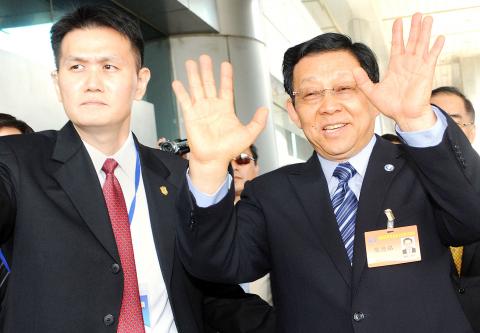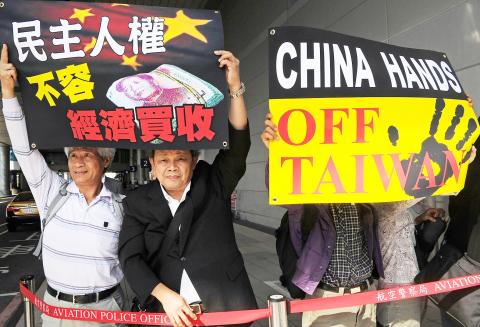Activists from various groups yesterday protested against a visit by the Association of Relations Across the Taiwan Straits (ARATS) Chairman Chen Deming (陳德銘) over concerns about the negative impact of the cross-strait service trade agreement.
Protesters from the Taiwan Solidarity Union (TSU) and civic groups followed Chen, who arrived in Taipei yesterday for an eight-day visit, at every stop, including the Taiwan Taoyuan International Airport and the Strait Exchange Foundation’s (SEF) headquarters.
“Any cross-strait trade agreement should be transparent, monitored by the legislature and the public and not to be handled by unofficial organizations such as the SEF,” said Chen Ting-hao (陳廷豪), spokesperson of the Black Island National Youth Front, which is largely comprised of university students.

Photo: Sam Yeh, AFP
“We oppose the trade mechanism, including the service trade pact, the soon-to-be-completed trade in goods agreement and the free economic pilot zones. They will only benefit large enterprises and harm local sectors,” he added.
The Black Island National Youth Front demanded that the government suspend the negotiations on a trade in goods agreement with Beijing until the principle of reciprocal and fairness is ensured.
The group’s views reflected widespread concerns by the opposition and various business sectors, which say that Beijing and President Ma Ying-jeou’s (馬英九) administration intend to push the service trade pact through the Legislative Yuan as soon as possible and that Chen Deming’s visit was likely a form of Chinese pressure.

Photo: Sam Yeh, AFP
The wave of protests began at about noon, with a group of students, TSU members and Falun Gong practitioners shouting slogans and holding placards and banners when Chen Deming appeared at the airport.
A student broke through police lines and got close to Chen Deming at the exit, but was taken away by officers. More than 100 officers had been deployed at the airport.
Chen Deming was greeted by SEF Vice Chairman Kao Koong-lian (高孔廉) at the airport, and attended a luncheon hosted by Taoyuan County Commissioner John Wu (吳志揚) while protesters were blocked outside the terminal.
He and his delegation later visited a free-trade harbor zone at the planned Taoyuan Aerotropolis project and the Taipei harbor, and then met with SEF Chairman Lin Join-sane (林中森) in the foundation’s building, where protesters were waiting outside.
There was a brief scuffle between protesters and police outside the building.
“The service trade agreement was a collaboration between the Chinese Nationalist Party [KMT] and the Chinese Communist Party [CCP] to hollow out Taiwan service industry’s competitiveness,” several TSU members said.
Chen Deming, who has visited Taiwan before, said he looks forward to experiencing the nation’s beauty and great food.
As China continues to open its markets and facilitate the reform of the economic system, he said businesses from the two sides of the Taiwan Strait should enjoy more opportunities and create more profits.
While his trip was aimed at promoting economic and trade cooperation between Taiwan and China and seeking cooperation opportunities, the SEF and the ARATS can also take the occasion to engage in follow-up negotiations on the Economic Cooperation Framework Agreement (ECFA), he said.
“The most important task across the Taiwan Strait is to promote the main items of the ECFA, including the early harvest list, investment protection, service trade, goods trade and dispute settlement. We should continue to work on it,” he said.
Taiwan’s free economic pilot zones, a project under which six harbors and the planned Taoyuan Aerotropolis will be designated as models of liberation, are the focus of Chen Deming’s trip.
Chen Deming’s delegation is to visit Pingtung County and Greater Kaohsiung today, then travel to Greater Tainan, Chiayi County, Greater Taichung and Hsinchu County, before returning to Taipei and New Taipei City (新北市).
Senior KMT members, including former vice president and KMT chairman Lien Chan (連戰) and former KMT chairman Wu Poh-hsiung (吳伯雄), and People First Party Chairman James Soong (宋楚瑜) will meet with Chen Deming during his trip.
Taipei Mayor Hau Lung-bin (郝龍斌) said he would also meet with the Chinese official and seek business opportunities for businesses in Taipei.

MAKING WAVES: China’s maritime militia could become a nontraditional threat in war, clogging up shipping lanes to prevent US or Japanese intervention, a report said About 1,900 Chinese ships flying flags of convenience and fishing vessels that participated in China’s military exercises around Taiwan last month and in January last year have been listed for monitoring, Coast Guard Administration (CGA) Deputy Director-General Hsieh Ching-chin (謝慶欽) said yesterday. Following amendments to the Commercial Port Act (商港法) and the Law of Ships (船舶法) last month, the CGA can designate possible berthing areas or deny ports of call for vessels suspected of loitering around areas where undersea cables can be accessed, Oceans Affairs Council Minister Kuan Bi-ling (管碧玲) said. The list of suspected ships, originally 300, had risen to about

DAREDEVIL: Honnold said it had always been a dream of his to climb Taipei 101, while a Netflix producer said the skyscraper was ‘a real icon of this country’ US climber Alex Honnold yesterday took on Taiwan’s tallest building, becoming the first person to scale Taipei 101 without a rope, harness or safety net. Hundreds of spectators gathered at the base of the 101-story skyscraper to watch Honnold, 40, embark on his daredevil feat, which was also broadcast live on Netflix. Dressed in a red T-shirt and yellow custom-made climbing shoes, Honnold swiftly moved up the southeast face of the glass and steel building. At one point, he stepped onto a platform midway up to wave down at fans and onlookers who were taking photos. People watching from inside

Japan’s strategic alliance with the US would collapse if Tokyo were to turn away from a conflict in Taiwan, Japanese Prime Minister Sanae Takaichi said yesterday, but distanced herself from previous comments that suggested a possible military response in such an event. Takaichi expressed her latest views on a nationally broadcast TV program late on Monday, where an opposition party leader criticized her for igniting tensions with China with the earlier remarks. Ties between Japan and China have sunk to the worst level in years after Takaichi said in November that a hypothetical Chinese attack on Taiwan could bring about a Japanese

The WHO ignored early COVID-19 warnings from Taiwan, US Deputy Secretary of Health and Human Services Jim O’Neill said on Friday, as part of justification for Washington withdrawing from the global health body. US Secretary of State Marco Rubio on Thursday said that the US was pulling out of the UN agency, as it failed to fulfill its responsibilities during the COVID-19 pandemic. The WHO “ignored early COVID warnings from Taiwan in 2019 by pretending Taiwan did not exist, O’Neill wrote on X on Friday, Taiwan time. “It ignored rigorous science and promoted lockdowns.” The US will “continue international coordination on infectious